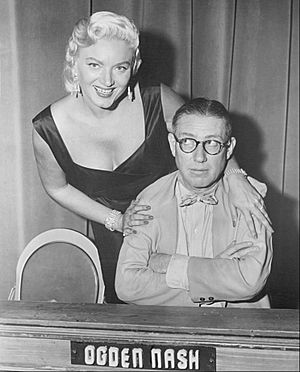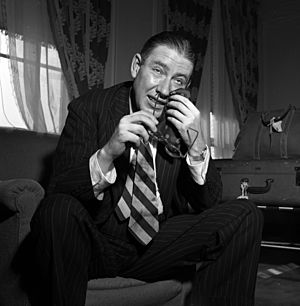Ogden Nash facts for kids
Frederic Ogden Nash (born August 19, 1902 – died May 19, 1971) was a famous American poet. He was known for writing over 500 funny poems, called light verse. He used very unusual ways of rhyming words. Because of his unique style, The New York Times newspaper called him the best-known writer of funny poetry in the country.
Contents
Early Life of a Poet
Ogden Nash was born in Rye, New York. His parents were Mattie and Edmund Nash. His father owned a company that bought and sold goods from other countries. Because of his dad's job, Ogden's family moved around a lot.
Ogden Nash loved rhymes from a very young age. He once said in an interview, "I think in terms of rhyme, and have since I was six years old." Sometimes, if a rhyming word didn't exist, he would even make up his own! He admitted that finding the perfect rhymes wasn't always easy.
His family once lived in a small house in Savannah, Georgia. This house belonged to Juliette Gordon Low, who started the Girl Scouts of the USA. Ogden Nash even wrote a poem about her house.
After finishing school at St. George's School, Nash went to Harvard University in 1920. But he left after only one year.
He then taught at St. George's for a year before moving back to New York. There, he tried selling bonds, which are like loans to companies or governments. He joked that he only sold one bond in two years, and that was to his godmother! But he did get to see a lot of movies.
Later, he started writing ads for streetcars. Then, while working as an editor at a book company called Doubleday, he sent some of his short, funny poems to The New Yorker magazine. The editor, Harold Ross, loved them and asked for more. Nash even worked on the magazine's editorial team for three months in 1931.
In 1931, Ogden Nash married Frances Leonard. That same year, he published his first book of poems, called Hard Lines. This book made him famous across the country. Some of his poems showed that he didn't always agree with how things were done. For example, in a poem called "Common Sense," he asked:
Why did the Lord give us agility,
If not to evade responsibility?
In 1934, Nash moved to Baltimore, Maryland. He lived there until he passed away in 1971. Baltimore truly felt like home to him. After a short time living in New York again, he wrote, "I could have loved New York had I not loved Balti-more."
A Career in Writing
When Ogden Nash wasn't busy writing poems, he often appeared on comedy and radio shows. He also traveled around the United States and the United Kingdom, giving talks at colleges and universities.
Other writers respected Nash's work. His poems were often included in important collections, even serious ones.
Nash also wrote the words for a Broadway musical called One Touch of Venus. He worked with other talented people like S. J. Perelman and Kurt Weill on this show. He also wrote lyrics for another musical in 1952 called Two's Company.
Ogden Nash was a big fan of the Baltimore Colts football team. In 1968, Life magazine featured him and his love for the team. The article included several of his poems about the Colts, along with full-page pictures. The magazine called him "the league leading writer of light verse" and "a fanatic of the Baltimore Colts."
Some of his most popular poems were about animals. Many of these poems showed off his unique and funny rhyming style. For example:
- "If called by a panther / Don't anther"
- "Who wants my jellyfish? / I'm not sellyfish!"
- "The one-L lama, he's a priest. The two-L llama, he's a beast. And I will bet a silk pajama: there isn't any three-L lllama!" (He later added a funny note saying, "The author's attention has been called to a type of conflagration known as a three-alarmer. Pooh.")
The best of his poems were collected and published in 14 books between 1931 and 1972.
Nash's Poetic Style
Ogden Nash was famous for his surprising, funny rhymes. Sometimes, he would even misspell words on purpose to make them sound funnier or to create a rhyme. For example, in a funny response to another poet, Dorothy Parker, he wrote:
A girl who's bespectacled
May not get her nectacled
Here, "nectacled" sounds like "neck tickled" when you say it out loud, making it rhyme with "bespectacled."
Sometimes, he made words rhyme by changing how they were pronounced, not by misspelling them. Like this:
Farewell, farewell, you old rhinoceros,
I'll stare at something less prepoceros
Another example of his clever rhyming is from "The Adventures of Isabel." In this poem, Isabel meets a witch who threatens to turn her into a toad:
She showed no rage and she showed no rancor,
But she turned the witch into milk, and drank her.
Nash often wrote in a very exaggerated style. His poems usually had pairs of lines that rhymed, but the lines were often different lengths and didn't follow a regular rhythm. For example:
Once there was a man named Mr. Palliser and he asked his wife, May I be a gourmet?
And she said, You sure may.
His poetry often played with old sayings or famous poems. For instance, he twisted a line from Joyce Kilmer's poem "Trees" (which says, "I think that I shall never see / a poem lovely as a tree"). Nash added his own funny line: "Indeed, unless the billboards fall / I'll never see a tree at all."
Other Fun Poems
Ogden Nash was a big baseball fan. He wrote a poem called "Line-Up for Yesterday" that listed famous baseball players in alphabetical order. It was published in Sport magazine in 1949. Here are a few lines:
C is for Cobb, Who grew spikes and not corn, And made all the basemen Wish they weren't born.
D is for Dean, The grammatical Diz, When they asked, Who's the tops? Said correctly, I is.
Nash also wrote funny poems for each part of the famous music piece The Carnival of the Animals by Camille Saint-Saëns. These poems are sometimes read aloud when the music is performed.
He also wrote poems for children, like "The Adventures of Isabel." This poem starts with Isabel meeting a huge bear:
Isabel met an enormous bear,
Isabel, Isabel, didn't care;
The bear was hungry, the bear was ravenous,
The bear's big mouth was cruel and cavernous.
The bear said, "Isabel, glad to meet you,
How do, Isabel, now I'll eat you!"
Isabel, Isabel, didn't worry.
Isabel didn't scream or scurry.
She washed her hands and she straightened her hair up,
Then Isabel quietly ate the bear up.
Later Life and Legacy
Ogden Nash passed away in Baltimore, Maryland, on May 19, 1971. He was 68 years old. He is buried in East Side Cemetery in North Hampton, New Hampshire.
When he died, The New York Times newspaper said that his "droll verse with its unconventional rhymes made him the country's best-known producer of humorous poetry."
Musical Show About Nash
A Broadway musical called Nash at Nine was created using some of Ogden Nash's poems as song lyrics. It opened in New York City in 1973.
Special Postage Stamp
The U.S. Postal Service honored Ogden Nash by releasing a postage stamp with his picture on it. This happened on August 19, 2002, which would have been his 100th birthday. The stamp included lines from six of his poems, including "The Turtle" and "The Cow."
Biography Book
A book about Ogden Nash's life, called Ogden Nash: the Life and Work of America's Laureate of Light Verse, was written by Douglas M. Parker. It was published in 2005 and included many parts of Nash's personal letters and poems.
Nash's Family
Ogden Nash had two daughters. His daughter Isabel married a famous photographer named Frederick Eberstadt. His granddaughter, Fernanda Eberstadt, is a well-known author, and his grandson, Nicholas Eberstadt, is a political economist. His other daughter, Linell Nash Smith, was also an author.
 | George Robert Carruthers |
 | Patricia Bath |
 | Jan Ernst Matzeliger |
 | Alexander Miles |



